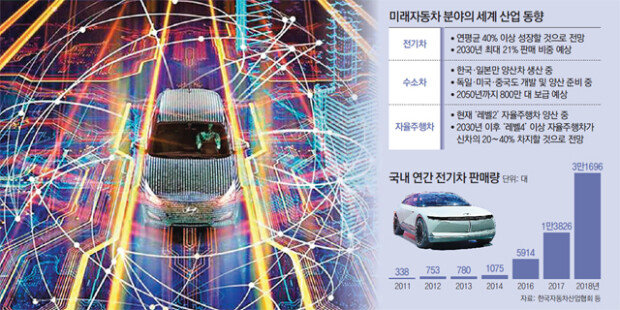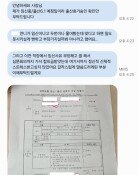Hyundai Motor shares plans for future cars and vision to build win-win mobility
Hyundai Motor shares plans for future cars and vision to build win-win mobility
Posted October. 16, 2019 07:31,
Updated October. 16, 2019 07:31

In line with the South Korean government’s announcement of future car industry strategy, Hyundai Motor Group has revealed its “future car ecosystem” strategy to be carried out with domestic small and medium-sized companies. Its vision is to build an automobile ecosystem promoting mutual growth beyond selected players’ success to be prepared for the new era of environment-friendly and self-driving cars.
Hyundai Motor Group said on Tuesday it will lead open innovations to create a future car ecosystem. Its plan is to set up a cooperation system involving start-ups and small and medium-sized players to popularize future cars of various types and mobility services.
The South Korean automaker predicted that a total of 41 trillion won will be invested in future technology development by the year 2015.
“We will build a win-win mobility ecosystem along with various market participants, including start-ups, through an open platform portal,” said Hyundai Motor Group Executive Vice Chairman Chung Eui-sun. “Hyundai Motor Group will be transformed from an automaker to a service company providing new experiences to customers.”
Some say that there need to be clear measures in response to challenges facing internal-combustion engine parts manufacturers and the overall decrease of new jobs in the car industry, which are inevitable in the course of transition to future cars. The advisory committee of Hyundai Motor’s employment stabilization committee recently expressed its concern over up to 20 to 40 percent decrease in the auto sector’s employment resulting from the transition to electric cars.
However, some argue that such prediction is based on the full transition to the new type of cars and that many potential scenarios should be considered instead, such as a future where the production of internal-combustion engine cars will be maintained to some degree while new types of cars, including hydrogen-powered cars, will become available.
The automobile industry believes that current major automakers in the world, including Hyundai Motor, will maintain its leadership in the future car industry. As the transition to future cars takes place over a relatively long period of time, traditional automakers with production lines in place are expected to generate more stable revenue in the self-driving field than IT players, such as Google, which have only recently entered the car market.
“As long as the government and the labor and management of the auto industry jointly address regulations hindering infrastructure investment for hydrogen cars and non-constructive conflicts between employees and management, the future of South Korea’s auto industry doesn’t need to be seen in a negative light,” said Jung Man-gi, the chairman of the Korea Automobile Manufacturers Association.
Do-Hyong Kim dodo@donga.com
Headline News
- N. Korea launches cyberattacks on S. Korea's defense companies
- Major university hospital professors consider a day off each week
- Italy suffers from fiscal deficits from ‘Super Bonus’ scheme
- Inter Milan secures 20th Serie A title, surpassing AC Milan
- Ruling and opposition prioritize spending amid tax revenue shortfalls







